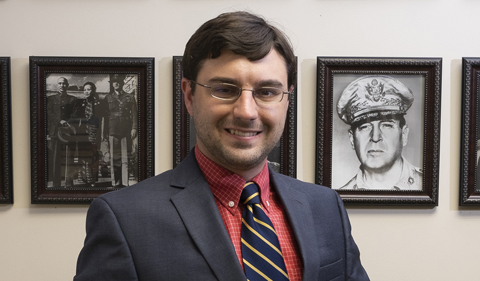
Alexander Lovelace, graduate student of history, poses for a portrait in his office on Tuesday, Oct. 1, 2019. (James Year/Ohio University Libraries)
A prolific writer, Alexander Lovelace earns his doctorate in history with a host of peer-reviewed articles behind him—and a book project and more in his near future.
Lovelace earned a Ph.D. in History and a Certificate in Contemporary History from Ohio University, graduating in August 2020.
His focus was on American and military history, with a dissertation on Total Coverage: How the Media Shaped Command Decisions During World War II.
Q: What stands out in your mind as you think about graduating despite COVID?
Frankly, I never imagined ending my doctorate in the situation like that created by the pandemic. It was disappointing to not be able to defend my dissertation or graduate in person. I am grateful, however, for both my dissertation committee and to the university for being flexible enough to find a way to finish in 2020. As always, the History Department and the Contemporary History Institute have been really helpful.
Q: What are your next steps/future plans?
Currently, I am looking for a job teaching history at the college level. Since employment opportunities are limited due to the pandemic, I am also working on having my dissertation published. The manuscript titled, The Media Offensive: How Real News, Fake News, and Public Opinion Shaped Allied Strategy during World War II is currently under peer review at an academic press. I have also started researching my second book, which will be a biography of Major General Everett S. Hughes, who was Eisenhower’s troubleshooter during World War II.
I likewise have a book chapter and article under review. The book chapter titled “‘A Major Readjustment’: Omar Bradley’s War Against The Stars and Stripes” tells the never before told story of General Bradley’s campaign to clampdown on stories he considered harmful to discipline in the U.S. military’s publication The Stars and Stripes. This is part of an edited collection for Fordham University Press on World War II reporting edited by G. Kurt Piehler and Ingo Trauschweizer. I also have an article under review titled “Meade and the Media: Civil War Journalism and the New History of War Reporting.” In it, I attempt to apply the argument and methodology I used in my dissertation to analyze the influence of the press on command decisions during World War II to a case study of the U.S. Civil War General George G. Meade who had a difficult relationship with the press.
Q: Can you provide some details on what you’ve published and your in progress book manuscript?
While earning my doctorate, I have been blessed with successfully publishing five peer reviewed articles in the journals of Parameters, Journalism History, The Journal of Slavic Military Studies, and the International Bibliography of Military History. These articles include topics on media-military relations such as the rise and fall of George S. Patton Jr. in the press and the attempted recruitment of journalists as spies. I also have published on a range of topics such as the changing understanding of shell shock in the U.S. Army, the historical memory of lend lease aid to the Soviet Union during World War II, and a literature review on the U.S. Military’s occupation of Nazi Germany.
Q: Who were your favorite professors and how did they make an impact on your life? Was it coursework or a life lesson that they passed on? And how did you apply that knowledge?
The outstanding faculty of the History Department and the Contemporary History Institute is one of the great blessings of studying at Ohio University. Their excellence in scholarship, teaching, and attention to graduate students is a truly rare combination. Though I could list several more, I have worked closely with three faculty members whose help was exceptional. The first was my dissertation adviser, Dr. Ingo Trauschweizer, whose excellence in teaching and editing suggestions were matched only by his continual patience and kindness. Dr. John Brobst unmatched knowledge of his subject and dedication to graduate students made my time at Ohio University much more enjoyable.
Finally, Dr. Robert Ingram allowed me to serve as his teaching assistant for six semesters and provided much useful advice on academia. While working with him, I was awarded the “Graduate Associate Outstanding Teaching Award” in the 2015-2016 academic year by the Graduate College of Ohio University.



















Comments